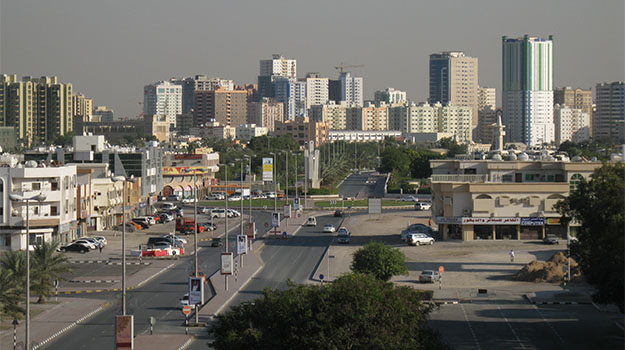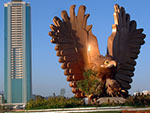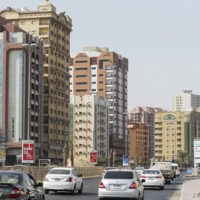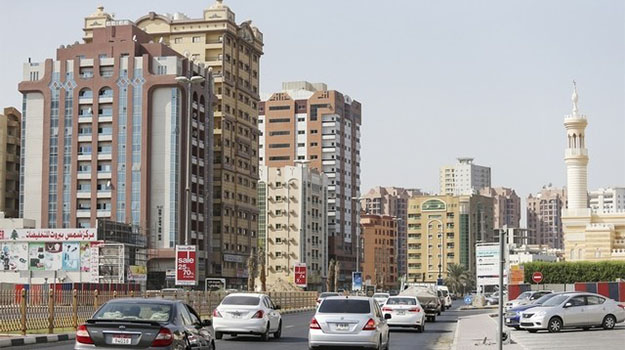The smallest of all the emirates, Ajman, nestling between Sharjah and Umm Al Quwain stretches for miles along the Arabian Gulf. Sandy white beaches and a topography that alternates between mountains and flat land add a special charm to this emirate. Ajman has the cleanest shores in the UAE and is free from pollution thanks to the government’s continued care and services.
Undoubtedly this tiny emirate is the secret find along the increasingly popular UAE coastline thronging with visitors from all through the year. The year- long and fantastic beach spots make it a great holiday destination.
This lively region covers a total area of 260 sq kilometers but size has nothing to do with what it offers its growing number of visitors. Ajman’s coastal area is about 16 km long, with billions of dirhams invested in various large-scale and strategic projects.
The region is made up of three geographical regions each topographically different according to its distance from the coast of the Gulf. These regions are Ajman city, Masfout region & Al Manama region
Ajman City
Majority of the population of the emirates live inside the city of Ajman. The population was only 36,000 in 1980 but grew rapidly due to the influx of people from the neighbouring emirates of Dubai and Sharjah as living in Ajman was decidedly cheaper. The Ajman city centre is a shopper’s destination with over a hundred international and local retail line shops to cater to a diverse range of tastes. The port of Ajman is located along a natural creek (Khor) which penetrates the town. The souks of Ajman are renowned for their excellent bargains
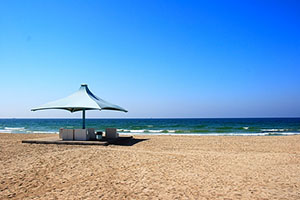
Al Manama Region
This is the ‘agricultural’ area of the emirate, about 60 km away from the town centre. The region is flat and some agricultural activities can be seen in this region like Munsat Valley, al Safsaf and Boay al Nakhil valley located between Ashqar and Ben Alwah Mountain.
Masfout Region
The inhabitants of this region are believed to be descendants of the Bodawat and Bay Ka’ab tribe. The Masfout region is about 130km away from the town centre and includes the Masfout city, Mzairea and Sabeigah towns with fascinating calcium stone mountains extending up to the Sultanate of Oman. Across these mountains are valleys like Gulfa Leshn Defdhaa and Hadf with high fertile soil and flowing water all year.
The City of Ajman is the capital of the emirate and houses the Ruler’s office along with other commercial establishments.
Ajman holds plenty of promises for the tourist, especially the golden beaches and different natural topography lying between mountains and flat sand.
In the recent past, various important discoveries have been made in the Muaihat, Al Zawara and Masfout region believed to date back to 2500 & 3500 B.C. The discoveries support the theory that first civilized human settled in these parts.
Tap water is considered safe to drink in Ajman, although it is slightly salty – the obvious reason for this being that tap water provided in homes is desalinated. The water is perfectly safe to brush your teeth or make tea. Bottled water is also available in any store around town. Alcohol is easily available at hotels and restaurants and is one of the major contributors to the economy of Ajman.
DEVELOPMENT AND ECONOMY
For long, emirate’s economy relied on fishing and trading which contributed in putting Ajman on a distinguished position among all the emirates. Today, it continues to have a strong economy, with various industries and plants uniquely enjoying the liberal governmental policies. There are over five hundred and fifty plants and factories with investments valued at AED 1497m. It is the home to the biggest group of textile industries.
Today Ajman has great investment opportunities for all kinds of businesses, its advanced and natural characteristics making it one of the most attractive areas for investments in the region. Ajman has the advantage of the location which is an added incentive for investors in the region which has thereby resulted in a construction boom in the recent years.
The construction boom here continues to add high-rise residential and commercial buildings the emirate. Ajman Real estate is providing a pivotal role in UAE’s real estate developments after the success of Dubai property market. Property in Ajman gives the investor a 100% freehold ownership on real estate, which has prompted the Ajman government to initiate a number of development projects in the near future.
Real estate in Ajman is visualizing its progress in two different approaches. Ajman real estate residency projects and Ajman real estate business development projects which include many on-going and future mid to mega level projects. Real estate companies are now investing heavily in the freehold properties ownership in Ajman because the market of Ajman is comparatively immature with respect to Dubai but with equal if not greater possibilities of becoming major business market of the world.
Property prices are extremely reasonable in Ajman, making it even more attractive to the investors and buyers to invest in this emirate. Its proximity to the skyscraper capital, Dubai, is an added advantage and is a positive sign for investors looking to gain appreciation on their property.
Major industrial sector in Ajman include wood and wooden products, tobacco, textiles, garments, furniture, printing and publishing, petroleum products, chemical products, rubber and plastic industry, non-metal mineral products.
Ajman’s natural harbour is home to one the largest ship repairing companies while Ajman Port offers the best facilities for business, import and export.
The increasing economic success of Ajman is reflected in the charming, wide avenues and clean lanes. In a bid to increase tourism in the emirate, Ajman developed one of the five star upmarket resorts comprising a large hotel complex and shopping center. Aside from the shopping complex, Ajman is also home to several local and international retail shops catering to a variety of tastes. Banks, commercial souks, the Ruler’s office and a number of private companies also line the streets, marking the city’s growing economic significance and bid to become completely independent.
HISTORY
Ajman is said to be formed by the Al Nuaim tribe, who migrated to the region from Oman around 1775. Sheikh Rashid Bin Al Nuaimi signed the General Maritime Treaty with Britain on January 8, 1820 which confirmed the protectorate status of Ajman to keep the Ottoman Turks out. Due to its important and strategic position en route to India, Ajman like its neighbors was recognized as a salute state.
However, on December 2nd 1971, Sheikh Rashid ibn Humayd Al Nuaimi joined the United Arab Emirates.
The Rulers
The ruling family belongs to the tribe of Naeem, which is a descendant of the Qahtani Tribe of Al Khazraj. The forefather of this tribe moved to Oman following the collapse of the Ma’arib Dam in Yemen three centuries before Prophet Mohammed’s mission. Later on, the tribe moved to Al Buraimi oasis where they ruled it for many centuries, after which the Al-Karatsa from the Al Bu Khreiban clan immigrated to Ajman where the residents chose Sheikh Rashid bin Humaid I, as their ruler in 1803 in appreciation of his virtue such as generosity, courage and chivalry. His sons and offspring have ruled Ajman in succession from that date including:
- Rashid bin Humaid I (1803-1838)
- Humaid I bin Rashid I ( 1st period 1838-1841)
- Abdul Aziz I bin Rahid I (1841-1848)
- Humaid I bin Rashid I (second period 1848-1864)
- Rashid II bin Humaid I (1864-1891)
- Humaid II bin Rashid II (1891-1900)
- Abul Aziz II bin Humaid I (1900-1910)
- Humaid III bin Abdul Aziz II (1928-1981)
- Rashid III bin Humaid III (1928-1981)
- Humaid IV bin Rashid III (since 1981)
GOVERNMENT
Ajman is ruled by H.H. Sheikh Hamid bin Rashid Al Nuaimi of the Al Nuaimi tribe and the Crown Prince of the Emirate is Sheikh Ammar bin Humaid Al Nuaimi. Ajman City is the seat of the emirates’ government. Ajman also controls Masfut and Manama regions and also the primarily agricultural inland enclaves. The Emirate of Ajman has achieved a remarkable and steady growth under the leadership of HH Sheikh Humaid bin Rashid Al Nuaimi, Supreme Council Member and Ruler of Ajman who led a comprehensive development and spurred a construction growth across the emirate that combines modernity with tradition. In fact the government of Ajman has effectively applied a modern ruling system while preserving the inherited traditions of the past, giving his people direct access to interact with him as a leader and father of the Emirate, through his open courtyard (majlis) and his constant inspection visits.
Important websites:
Ajman Municipality (http://www.am.gov.ae)
Ajman Government (http://www.ajman.ae)
Ajman Chamber of Commerce (http://www.ajcci.gov.ae)
Ajman Free Zone Authority (http://www.afza.gov.ae
CLIMATE
The climate of Ajman is usually moderate with temperature and humidity ranging between 35 to 40 degree centigrade in the summer months and down between 15-18 degrees in winter months.
ARRIVING AND GETTING AROUND
Ajman does not have its own airport; however nearby international airports in Sharjah and Dubai service all the visitors to this emirate. Taxi service is available at all the airports.
If you decide to travel on your own to the emirate, the best, easiest and less congested option would be through Sharjah on Emirates Road (E11). Signboards are clearly marked. There is no way you could miss it.
Within the emirate, transportation is limited to taxis. Both metered and non-metered (and hence cheaper) taxi services are available. Shared taxi service to other emirates is also easily available.
If you are staying at a hotel in Ajman, often you can avail the tour bus service for a tour of Ajman and surrounding areas.
Famous Theologians and Judges
- Sheikh Abdulkarim bin Ali Al Bakri.
- Sheikh Abdulla bin Mohamed Shibah Al Nuaimi.
- Sheikh Hamad bin Saleh Al Ghanem Al Suwaidi.
- Sheikh Hamad bin Ghanem Al Shamsi.
- Sheikh Hamad bin Mohareb Al Mutairi.
Captain Divers and Pearl Traders
- Seif bin Rashid Al Hamrani.
- Ali bin Juma Al Ma’ai Al Muhairi.
- Nasser bin Obaid Al Lootah.
- Ahmed bin Ali Kajoor Al Nuaimi.
- Humaid bin Rashid bin Kooli Al Suwaidi.
- Brothers Ali & Mohamed sons of Moftah bin Obaid Al Shamsi.
Poets and writers
- Rashid bin Salem Al Khedr.
- Rashid bin Thani Al Shamsi.
- Ghanem bin Obaid Al Assri.
- Majed bin Ali bin Salem Al Nuaimi.
- Salem bin Khalifa Al Thafferi.
- Hamad bin Ali bin Obaid Busalman Al Shamsi.
- Hamad bin Khalifa Bushhab.
- Hamad bin Mohamed Bushhab.
- Rabei bin Yaqoot.

